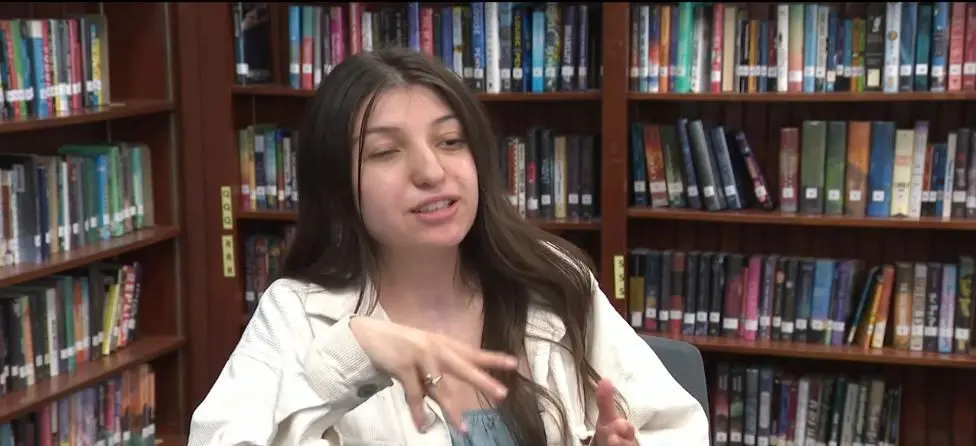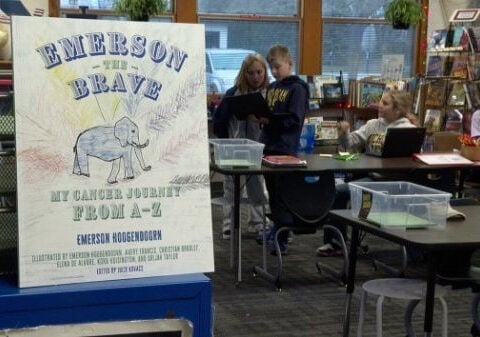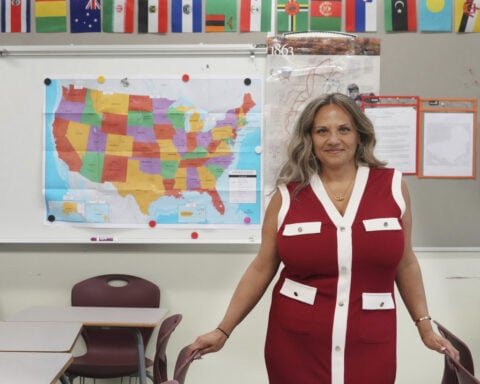DALLAS (KTVT) -- At 17, Delila Vasquez has decided that her disabilities don't define her.
"It made me become stronger," shares the Woodrow Wilson senior. "And you realize I have a life ahead of me."
Delila communicates with confidence, signing her words to ensure the deaf community feels included. As a "deafblind" individual, she has limited vision in one eye and relies on a bone-anchored hearing auditory implant (BAHA) to hear.
"It's okay to give up in the moment," she admits, "but also take your time to stand up and show the others that you could do it too. And they can do it too. And we all could do it together."
Delila says she was always stubborn, but adds the confidence took time: enough to try tennis, dancing, space camp, and even writing a book. Why?
"To inspire other kids to help them," she said. "I like helping people to know they're not alone."
And she knows that feeling well. Delila was born with a rare genetic disorder called CHARGE syndrome. It's an acronym of symptoms that affect patients' eyes, hearing, heart, growth and more. She says she's lost count of the many hospital stays and surgeries over the years, and those are just the physical challenges.
"In the past I was very different. I was very quiet," she said. "I was very insecure of myself and I was being bullied. So now, I'm better now. I feel confident to love myself."
And she'd like to help other children managing disabilities reach that happy place much sooner.
"When she was younger, like with her trach scars, she would wear a jacket all the time, zipped all the way up," said Crystal Sapir, a DISD deafblind teacher. "She has been that kid that she's trying to encourage other people not to be."
Sapir has taught Delila since fourth grade. She receives support services as part of the Regional Day School Program for the Deaf. The program supports deaf students throughout their educational journey. And Sapir helped Delila get "In Charge of My Life" published.
"I'm so proud that she was able to get her story out for others and help other families because people don't understand, like when they're in the hospital, they miss so much of school and they have to catch up," Sapir said.
The book's cover was designed by Melissa Brito, Dallas Museum of Art, and Delila says it deliberately transitions from darker colors to light. The cover shows an outline of a grown-up Delila embracing the child she once was. And the advice she'd give her younger self? The answer came quickly.
"Please listen to your moms!" she shared with a big laugh and a wide smile. "Mom's always right! PLEASE listen!!!"
I couldn't have said it better myself in any language.

 German Christmas market ramming is the latest attack to use vehicles as deadly weapons
German Christmas market ramming is the latest attack to use vehicles as deadly weapons
 How to save a fentanyl victim: Key facts about naloxone
How to save a fentanyl victim: Key facts about naloxone
 Eight convicted in France over murder of teacher who showed Prophet caricature
Eight convicted in France over murder of teacher who showed Prophet caricature
 In a calendar rarity, Hanukkah starts this year on Christmas Day
In a calendar rarity, Hanukkah starts this year on Christmas Day
 What to know about Hanukkah and how it's celebrated around the world
What to know about Hanukkah and how it's celebrated around the world
 Russia's UK embassy denounces G7 loans to Ukraine as 'fraudulent scheme'
Russia's UK embassy denounces G7 loans to Ukraine as 'fraudulent scheme'
 Retailer Party City files for bankruptcy, will wind down 700 stores
Retailer Party City files for bankruptcy, will wind down 700 stores
 Philadelphia 76ers star Joel Embiid working through injuries and mental health struggles
Philadelphia 76ers star Joel Embiid working through injuries and mental health struggles
 Weightlifting Taiwan granny, 90, garners cheers, health benefits at gym
Weightlifting Taiwan granny, 90, garners cheers, health benefits at gym
 Soccer's top players have had enough, as FIFA's new super-sized tournament sparks a revolt
Soccer's top players have had enough, as FIFA's new super-sized tournament sparks a revolt








